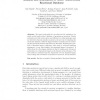Free Online Productivity Tools
i2Speak
i2Symbol
i2OCR
iTex2Img
iWeb2Print
iWeb2Shot
i2Type
iPdf2Split
iPdf2Merge
i2Bopomofo
i2Arabic
i2Style
i2Image
i2PDF
iLatex2Rtf
Sci2ools
TSD
2009
Springer
2009
Springer
Analysis and Assessment of AvID: Multi-Modal Emotional Database
The paper deals with the recording and the evaluation of a multi modal (audio/video) database of spontaneous emotions. Firstly, motivation for this work is given and different recording strategies used are described. Special attention is given to the process of evaluating the emotional database. Different kappa statistics normally used in measuring the agreement between annotators are discussed. Following the problems of standard kappa coefficients, when used in emotional database assessment, a new time-weighted free-marginal kappa is presented. It differs from the other kappa statistics in that it weights each utterance’s particular score of agreement based on the duration of the utterance. The new method is evaluated and the superiority over the standard kappa, when dealing with a database of spontaneous emotions, is demonstrated. Key words: Emotion recognition, Kappa statistics, Emotional database
| Added | 27 May 2010 |
| Updated | 27 May 2010 |
| Type | Conference |
| Year | 2009 |
| Where | TSD |
| Authors | Rok Gajsek, Vitomir Struc, Bostjan Vesnicer, Anja Podlesek, Luka Komidar, France Mihelic |
Comments (0)

